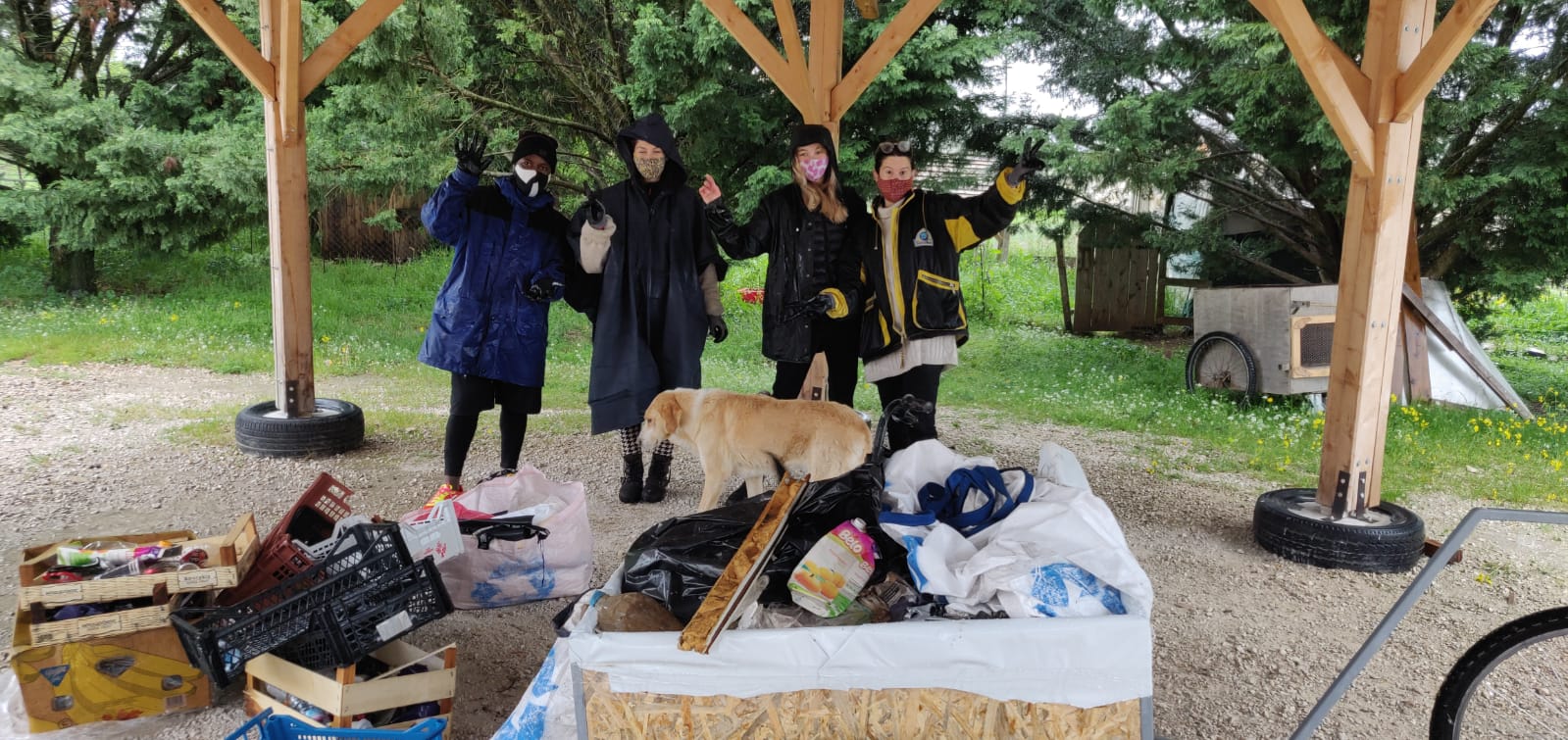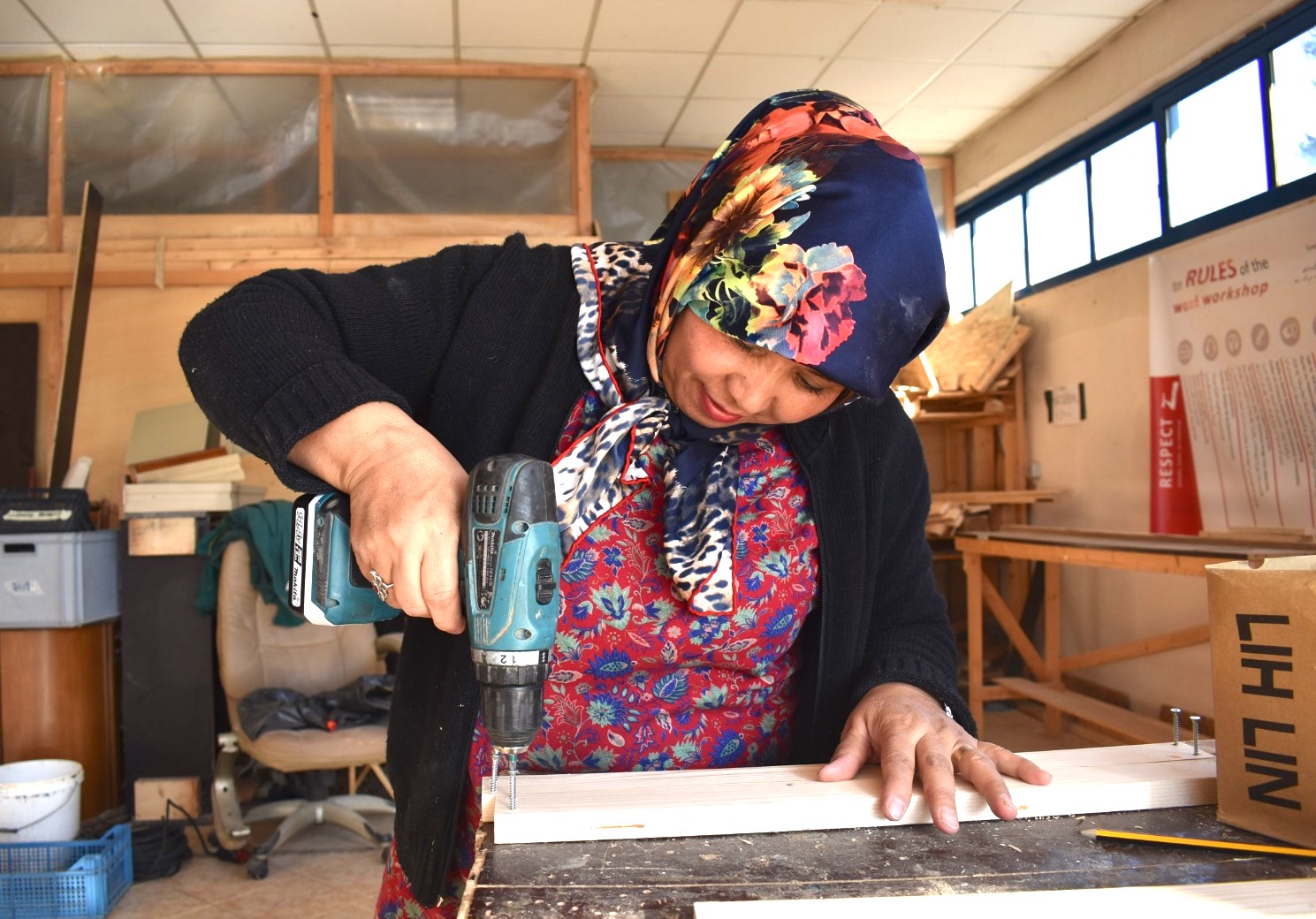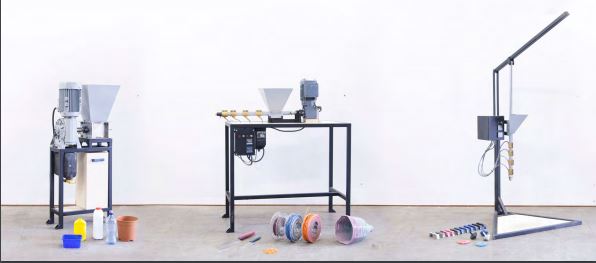Re.Works

Useful information
- Team members
- Effie Georganta David Camps Novi Laura Laipple Ferdi Bayer Louis Bindernagel Mimi Hapig Esther Ten Zijthoff Fred Gilbert - Downs Mireia Soler Sucarrats
- Country
- Greece
- Keywords
- Plastic upcycle recycle refugees asylum seekers integration social inclusion sustainability human needs
Short Description
Re.Works is a circular plastic recycling workshop within the intercultural maker space Habibi.Works.
Detailed Description
Re.Works is based on the Precious Plastic open-source movement to boost plastic recycling. The workshop will be a new addition to the existing makerspace Habibi.Works and aims to tackle two intersecting issues: 1. The amount of plastic waste in Katsikas, Greece and 2.) The lack of integration channels between the local population and the residents of Katsikas refugee camp, which currently hosts 1100 refugees and asylum seekers.
Using a participatory learning model, the workshop will not only upcycle plastic waste but also increase awareness among collaborating partners and workshop participants about the dangers of plastic as well as viable alternatives and recycling methods. In the workshop, plastic waste will be transformed into urgently needed products for members of both the local and refugee communities.
Plastic waste, the raw material for the workshop activities, will be collected through the
set up of collection points and the weekly clean ups with people from both communities.
Project Details
- Does your design take social and cultural challenges and human wellbeing into consideration?
Re.Works, as an extension of the existing Habibi.Works makerspace, will maintain and promote the same representation and inclusion values.
Habibi.Works exists to bridge barriers to integration by acting as a platform for education, empowerment and meaningful encounters between the asylum seeker and refugee community of Katsikas, Greece and the local, Greek community. By involving members of both communities in its activities, it will enable these, largely disparate, communities to work towards the common goal of a cleaner, more sustainable environment for all. As an extension of the existing Habibi.Works makerspace, Re.Works will abide by the same ‘ground rules’ for interaction as the makerspace, which include: working at eye level; respecting others regardless of gender, sexual identity or background; and creating equal opportunities for all to participate. The Habibi.Works approach is premised on the belief that each person is the expert of their own lives, and has the capacity to develop their own solutions to the challenges they face. Therefore, users are encouraged to create their own solutions, share their abilities and expertise, while also gaining transferable new skills.
Residents of Katsikas refugee camp face indefinite waits while their asylum applications are reviewed, and many remain in the camp even after receiving an official response, given the significant barriers they face in terms of accessing affordable housing, employment and education pathways, and social support structures. The few support structures that are available tend to offer “help” to refugees and asylum seekers in a way that strips them of agency and dignity and perpetuates dependency on a weak system. The lack of dignified, empowering avenues for individuals to gain agency over their own lives and to put their existing skills and knowledge to use are the very reason Habibi.Works - an intercultural makerspace - was established in 2016. The makerspace provides a platform in which all are welcome to participate, but also one in which a marginalised community is encouraged to take ownership, share their expertise, design and create their own solutions.
- Does your design support sustainable production, embodying circular or regenerative design practices?
One of the main ideas behind Re.Works is to revalue plastic as a material and resource and to give it new shapes and thus new purpose, according to the needs and solutions the participants envision. Re.Works aims to give value to a resource that other people consider waste, while at the same time questioning our existing patterns of consumption.
Anybody who chooses to participate in the project at any moment will be involved in the design and production process of the final product. Through this participatory approach, we ensure that the outcome of each workshop adds value and has a positive impact on the final users’ lives. Habibi.Works can look back at an impressive history of adapting to people’s needs within a complex, ever-changing context. It is of the utmost importance to keep the design process open throughout the implementation of Re.Works, creating more sustainable designs with each round of workshops and carrying out a production that is tailored to everyone’s specific needs and preferences.
Eventually, Re.Works space will not only provide immediate solutions to people’s needs through tangible objects, but it will also equip participants with information about the problems caused by plastic and mass production. The new working space of Habibi.Works will create a platform to discuss sustainable solutions to plastic waste and consumption.
- Does your design use principles of distribution and open source?
Re.Works as a project is located within the Precious Plastic movement, whose main objective is to provide and share information to ease and promote plastic recycling. In the Precious Plastic movement, all information generated is published online as an open-source to ease the path of starting a low-tech plastic recycling workspace anywhere in the world. There are more than 400 existing workspaces that have used Precious Plastic blueprints to build and operate machines. On their online platforms, more than 70.000 like-minded people meet and exchange ideas, help each other and adapt existing solutions to local problems.
By being part of this extensive network we will benefit from the wealth of information that is available. Moreover, we are also going to be contributing to new designs, experiences and will engage in collaborations with local actors sharing the same values.
- Does your design promote awareness of responsible design and consumption?
Re.Works wants to shine a light on plastic pollution by providing various means to repurpose the material. This idea will be widely spread through the different steps taken to recycle plastic:
Collection: Habibi.Works will partner with local businesses nearby and designate them as partner collection points where plastic waste can be collected and transported to Habibi.Works. We aim to build a minimum of 5 local collection points to bring awareness to the mass consumption of plastic and rethink the way we consume.
Clean ups: To promote the workshop activities as well as to raise awareness about the issue of plastic waste, Habibi.Works will organise cleanups with camp inhabitants and other members of the refugee and asylum seeker communities, as well as members of the local Greek community. This will have the added benefit of creating a shared point of meaningful encounters between these communities and bring awareness of the amount of waste we generate with our current way of consumption. The plastic collected will be used for the workshops mentioned below, feeding the circular concept of the project.
Workshops to recycle plastic: With the workshop space in place, Habibi.Works will organise regular workshops where participants receive information about plastic waste, its implications, and the methods to reduce, reuse and recycle the plastic we generate at the moment. Particiüants will furthermore be walked through the process of turning plastic waste into functional, practical items that improve their living conditions, through a participatory learning model.
Engage in collaborations: In order to have a broader impact, we will engage in further collaborations with local institutions such as education centres, museums and self-organized groups.
Images


